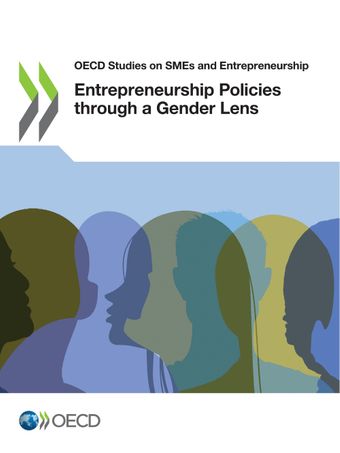In OECD countries, women are less likely to be entrepreneurs than men and tend to operate smaller and less dynamic businesses. This represents lost income and innovation for the economy and lost opportunities for women and their families.
This CIMR Debate in Public Policy takes its name from a new report examining trends and barriers in entrepreneurship from a gender perspective. It is the result of a collaborative effort between the Global Women’s Entrepreneurship Policy (GWEP) Research Network and the OECD, featuring contributions from academics across 27 countries.
Two of the editors, Dr Jonathan Potter (OECD) and Professor Colette Henry (Dundalk Institute of Technology and GWEP), were joined by Professor Severine Le Loarne-Lemaire, (Grenoble Ecole de Management and founder and holder of the “Female Entrepreneurship for a Renewed Economy” Chair) to discuss the report in more detail.
Key themes and findings
Dr Jonathan Potter, who chaired this event, began the discussion by outlining some of the key messages from the work of the OECD and the GWEP:
- Women are often disadvantaged in access to finance, skills and networks.
- The COVID-19 pandemic has hampered and even reversed previous progress in reducing the gender gap.
Professor Colette Henry guided the audience through a deeper dive into the report’s key findings. The report revealed a mixed picture of government support for women entrepreneurs, including countries with successful policies, countries with policies that do not work, countries where there are policies with no programmes to deliver them or programmes with no guiding policy framework, and some countries with no policy whatsoever.
Colette praised Canada’s Women’s Entrepreneurship Strategy, stressing that, if a government is serious about promoting women’s entrepreneurship, they must include it in their overarching policy.
Where existing policies had little impact, it was often due to being at odds with other elements of the entrepreneurial ecosystem. For example, policies in Germany are designed for the male breadwinner, making entrepreneurship less attractive to women, while in Pakistan, weak regulatory systems lead to discrimination and poor access to financial capital.
In terms of future policy, Colette shared the following takeaways:
- The narrative of women entrepreneurs as a minority group who are lacking in skills persists and needs to be changed.
- Access to financial capital was the top barrier reported by country teams.
- Actions should be implemented in sectors where women predominate.
- Women’s entrepreneurship needs to be embedded in formal government policy and linked to the wider entrepreneurial ecosystem.
- The current lack of evaluation and monitoring criteria needs to be addressed.
- Women are not a homogenous group and one size does not fit all.
Case study: women’s entrepreneurship in France
Professor Severine Le Loarne-Lemaire shared insight into women’s entrepreneurship using the situation in France as a case study.
A longstanding policy aim in France has been to reach a proportion of 30% women entrepreneurs.
While on the surface this goal has been met, at 32.1% women entrepreneurs in 2021, Severine argued that the data masks a mixed picture on the ground. Firstly, a significant proportion of women entrepreneurs are self-employed and do not earn enough money to be financially independent. This perpetuates the idea that female entrepreneurship is an activity for housewives to earn ‘pocket money’, rather than as the main breadwinner of the family.
Severine also questioned the impact of existing policy, as despite an increase in funding in this area, the percentage of women entrepreneurs has remained stable.
Interestingly, Paris is a poor performer on this issue regionally, while Brittany and Corsica come out on top, due to private investment and networks in the former and a stronger matriarchal culture and policy in the latter.
Severine echoed Colette’s call for an end to a one-size-fits-all approach to supporting women entrepreneurs in favour of better consideration of the micro context.
The presentations were followed by a lively Q&A from audience members, who were interested to hear more about best practice in entrepreneurship policy and who shared their own experience as women entrepreneurs.
The report ‘Entrepreneurship Policies Through a Gender Lens’ is free to read online.
The recording of this workshop is available here.

